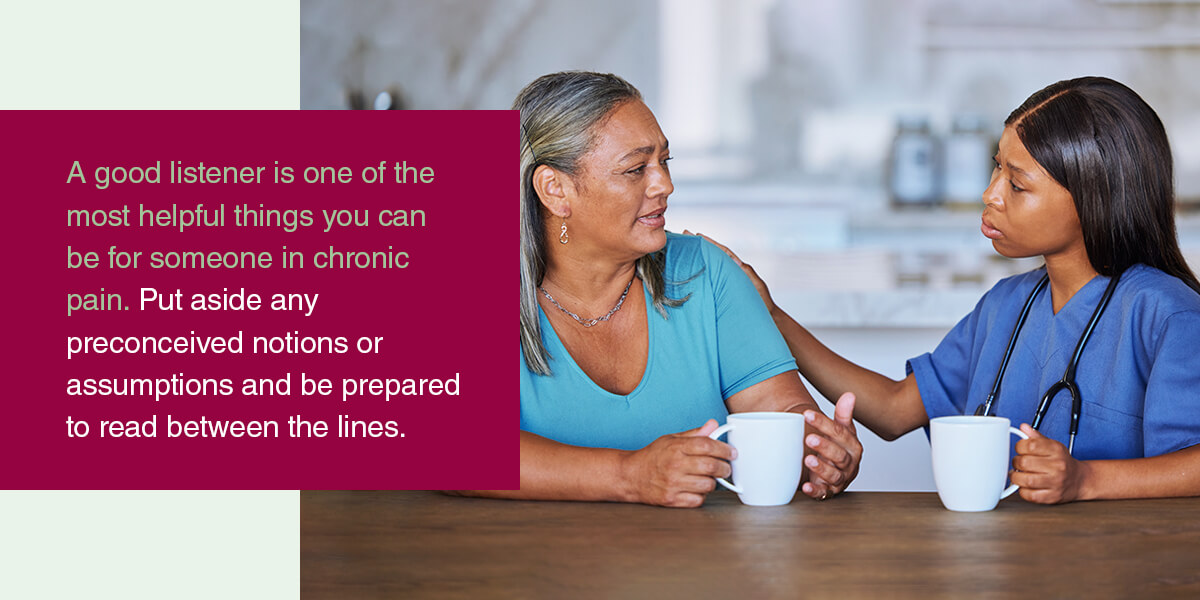How to Care for Someone With Chronic Pain
How to Care for Someone With Chronic Pain

Chronic pain can be debilitating for the sufferer and heartbreaking for their loved ones. If you’re helping a friend or family member living with chronic pain, taking the right approach can make all the difference.
Learn how to help someone with chronic pain with our insights and tips.
Table of Contents
The Impact of Chronic Pain
To care for someone with chronic pain, it’s helpful to understand how their condition impacts every aspect of their life.
Mental Health
Chronic pain can have a significant effect on your loved one’s mental health. In addition to feeling stress and fear related to their condition, those who suffer from chronic pain are at a greater risk of mental health disorders like anxiety and depression.
Independence and Self Confidence
Chronic pain can hinder your loved one’s level of functioning and ability to carry out certain tasks. As a result, they may need to ask for help, which can be demoralizing. A loss of independence can be challenging to cope with, impacting one’s self-confidence.
Chronic pain may cause your loved one to become frustrated or angry with their body for limiting them in so many ways. They may even begin to disassociate from their former self, losing their sense of identity.
Memory and Cognition
Long-term chronic pain can alter the structure of the brain, leading to cognitive difficulties and memory impairments such as Alzheimer’s disease and dementia. Your loved one may have trouble making decisions or regulating their emotions.
Cardiovascular Health
Chronic pain is often associated with high blood pressure. The nervous system can lose its ability to regulate blood pressure as it works to eliminate chronic pain. High blood pressure can lead to serious cardiovascular events like heart attack and stroke.
Muscular Deconditioning
Those with chronic pain are often afraid of doing things that can worsen their pain. They may avoid physical activity as a way to protect themselves.
If your loved one’s pain is in a specific location, they may favor that area, avoiding placing weight on it or using it in the hopes of mitigating discomfort. However, without proper physical exercise, the muscles can weaken and become conditioned, further immobilizing the chronic pain sufferer.
Hormones
Chronic pain interferes with the endocrine system, which produces hormones responsible for many processes in the body. As pain persists, the endocrine system becomes unable to adapt to the stress of pain, and hormone production may decline.
The most serious hormonal imbalances associated with chronic pain are related to cortisol. Chronic pain initially causes a spike in cortisol, which can lead to complications such as arthritis, tooth decay and kidney stones. If chronic pain goes untreated, cortisol levels can drop, causing weight loss, weakness, muscle wasting and low blood pressure.
Social Connection
Many people living with chronic pain withdraw from social activities. They may not feel well enough to be out and about, fear that socializing will worsen their pain or feel unable to keep up with friends and family. Whatever the reason, a lack of social connection can lead to feelings of isolation, loneliness and depression, as well as other adverse health conditions.
Sleep
Chronic pain can make it difficult to get a good night’s sleep. Without adequate rest, the body can suffer in many ways. Sleep deprivation is linked to heart disease, kidney disease, stroke, obesity, diabetes and depression.
In addition to physical health effects, lack of sleep can disrupt your loved one’s lifestyle and routine. They may sleep late, take naps during the day and be less active. As a result, it can be difficult for everyone involved to adjust to these changes in daily life.
Work and Finances
Many chronic pain sufferers are unable to work, which can lead to financial strain. Stress surrounding finances may also worsen chronic pain symptoms.
For those who can work, chronic pain can make it difficult to focus on tasks and projects. They may need to take sick days and time off to rest and recuperate from work demands.
6 Tips for Caring for Someone With Chronic Pain
The following tips can help you care for someone with severe pain or chronic illness.
1. Understand That Chronic Pain Is Complex and Individualized
Pain is an intricate phenomenon unique to each individual. Chronic pain causes more than just physical discomfort, interfering with a person’s mental and emotional well-being. This multi-faceted experience will look and feel different for everybody, so it’s important to empathize with your loved one, but recognize you may never truly understand what they are going through.

2. Listen to Verbal and Nonverbal Cues
A good listener is one of the most helpful things you can be for someone in chronic pain. Put aside any preconceived notions or assumptions and be prepared to read between the lines. The way in which your loved one says something is just as important as what they say.
As you listen, be aware of any severe or uncontrolled pain indicators, such as irritability, restlessness, concentration difficulties, sweating, decreased activity and any thoughts of self-harm.
3. Believe What They Say
Some people do not believe chronic pain sufferers when they communicate their needs and experiences. One reason is the myth that chronic pain sufferers overemphasize their pain to garner sympathy or dodge responsibilities.
You care about the person in pain, so be receptive and compassionate about what they share with you. Appreciate their willingness to open up about their condition, and express this gratitude to your loved one to show that you believe them and genuinely care.
4. Educate Yourself
You may have many questions about chronic pain, and while your loved one can provide answers, they may also be in denial or unwilling to discuss their condition. For this reason, it’s a good idea to research chronic pain on your own. Educate yourself on underlying causes, symptoms, complications and treatments so you can be an ally in your loved one’s battle with chronic pain.
5. Honor Physical Limitations
Chronic pain sufferers may experience varying physical limitations from day to day. Remember that you cannot know the extent of their physical pain. For this reason, it’s essential to take your loved one at their word if they say they need to sit down, lie down or take medication.
6. Monitor for Symptoms of Depression
Those living with chronic pain are at risk for depression. If you notice any signs of depression in your loved one, discuss them and offer your love and support. Encourage your loved one to mention how they’re feeling to their doctor, and offer to accompany them to their next appointment if you can.
Contact Upper Cervical Chiropractic of Monmouth, LLC for Chronic Pain Support
At Upper Cervical Chiropractic of Monmouth, LLC, our experienced doctors are committed to addressing the root cause of chronic pain. We employ a gentle approach to caring for those with chronic pain so they can comfortably return to a happier life.
To help manage chronic pain, schedule a complimentary consultation through our convenient online scheduler.





